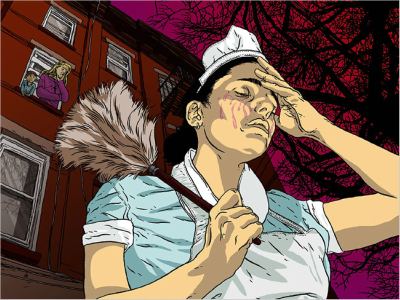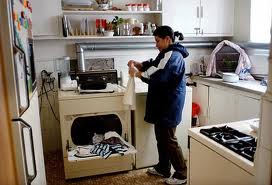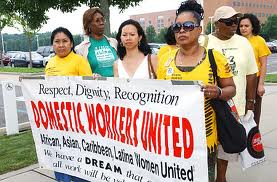 This one hour radio documentary produced in 1976 combines moving and poignant oral history interviews with senior women — mostly Irish, German, Scandinavian and Eastern Europeans — who immigrated to New York in the early 20th century and worked as maids and household help most of their lives together with interviews with African-American women who comprise more than half of domestic workers by the mid-70’s.
This one hour radio documentary produced in 1976 combines moving and poignant oral history interviews with senior women — mostly Irish, German, Scandinavian and Eastern Europeans — who immigrated to New York in the early 20th century and worked as maids and household help most of their lives together with interviews with African-American women who comprise more than half of domestic workers by the mid-70’s.
In the early 1900s most domestic workers, laundresses, cooks and child nurses in New York were Irish, German and Russian. Very few Jewish or Italian women did household work…preferring to work in the garment trade. Many of these interviewees had already worked as servants in Europe — as young children. They describe the categories among the some 300 employment agencies in New York for domestics — “New immigrants,” or “German speaking” or “White only.” Many employment agencies had terrible reputations for bilking both employees and employers and running unsafe boarding houses for domestics. Then they started running ads in Southern newspapers. With the mass migration North by Southern Blacks from the 1920’s onward, increasingly domestic work in New York was done by African-American women.
Relentless Toil
Many of these domestics — whether white or black — complain of the long hours, low pay and poor food. The older European women — now retired — say they worked from 7 to 7 for $3-$7 a week in the early years. “I had 10 large rooms to clean, bay windows to wash inside and out, make breakfast for children and pack their lunches, answer the door and telephone.” “Ihad so much laundry, I fainted.”
“My hands were always bleeding.” Several of the African-American domestics complain of the lack of food. “They fed us like children. A peanut butter sandwich for dinner. While they went out to a restaurant.” Not all the conditions were so bad. One Czheckoslovakian immigrant who worked as a maid during the early 20’s said that she worked for a Jewish family who fed her well and she learned English from the children.
Sleeping In
For many domestics, the worst part of the job was having to sleep in with the family. “Some women slept in the kitchen. You had to wash up in the kitchen.” It meant that their work day never ended, and they had little privacy nor time for a personal or social life. Finding a husband was difficult. “One employer wanted me to work Saturdays and I quite because I had just met a boyfriend and I wanted to go dancing on Saturday nights!” Thursday was usually maid’s night out in New York and all the dance halls were packed. For some household workers there were unwelcome sexual advances from their employers. “When I refused, my employer told me that the other girl had done this. I quit.”
“I can say this…the money part has changed, but the work hasn’t changed any!”
Produced in 1976 this documentary reflects the conditions and aspirations of domestic workers by that time. The documentary includes interviews with a group of women who are organizing household workers to demand minimum wage ($3/hr in 1976!), sick leave, medical care, workmen’s compensation and coffee breaks as well as efforts to have employers make deposits into their social security accounts.
“This work requires patience, discipline, self-respect. You have to change yourself. You do all that work and still you are looked down upon. You are the lowest of all workers.”

elizabethosta@gmail.com I’m thrilled with this work. Thank you. I’ve written two books (Jeremiah’s hunger, Borealis, 2011) and (Saving Faith, Cosmographia, 2017 ) and love this approach. I will be working on a third about Cancer Survivors and think these kind of interviews might be a great approach.
Hi, I’ve found your project I Won’t Get Down On My Knees through research into servants in America in the 1920s. I’d love to listen to the full recording to inform a youth theatre project I’m doing. Let me know if that would be possible.
Thanks!